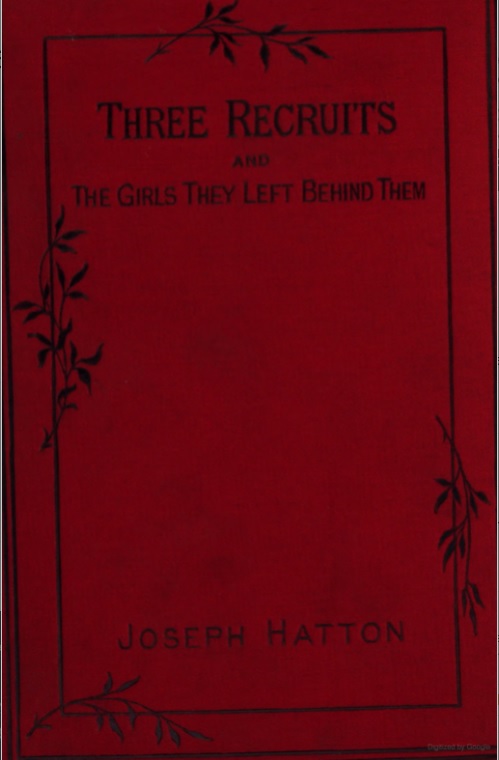Serialised fiction in the Bolton Weekly Journal – The Three Recruits, and the Girls They Left Behind Them (1879-80) by Joseph Hatton

Joseph Hatton was born in 1841 in Andover, Hampshire. Hatton’s parents, Francis and Mary, moved to Chesterfield when he was young, and Hatton became an apprentice printer for his father, and later, a novelist and a journalist. He married Louisa Johnson and they had three children together: Frank, novelist Bessie, and artist Helen (Troy J. Bassett, 2020). Hatton worked as Editor at The Sunday Times from 1874 to 1881 (Wikipedia, 2021), and has links to Bolton through his stories serialised within the Bolton Weekly Journal, such as The Three Recruits, and the Girls They Left Behind Them, published weekly from September 1879 to March 1880 (Bassett, 2020). The serialised story contained sensational elements: villainous characters and murder. The Three Recruits received mixed reviews from critics at the time of publication.
A reviewer for The Athenaeum declared that “there is not much to be said in praise of the story” (1880, p.500). Indeed, The Athenaeum regarded the historical novel as incompetent, commenting on how Hatton’s story “seems to be intended to embody his view of what manners and customs were in the beginning of the century than to enhance his fame as a novelist proper” (1880, p.500). In this fashion, the review critiques Hatton’s seemingly anachronistic historical details: “our author is not particularly accurate—at least some statements astound us a little (1880, p.500). Although the novel stars as part of the ‘Novels of the week’, The Athenaeum attempts to erase the significance of the novel as well as its characters: “The character of Mr Scruton […] is impossible as it is repulsive […] neither the three recruits nor the girls [..] have much originality” (1880, p.500).
In a much lengthier review dedicated to Hatton’s Three Recruits published in the Saturday Review of Politics, Literature, Science and Art, the historical novel again is criticised for its inaccuracies:
“He labours hard at his descriptions of the times in which he lays his scene; and, if he does not succeed in giving a picturesque account of the early years of this century, it is certainly not for want of effort. Unfortunately, he fails in accuracy. […] No writer of the year 1811, not even the dreamers among them, would have thought of such phrases as our author, in strict accordance no doubt with the usage of the present time, introduces” (1880, p.543-44).
However, despite this critique, the Saturday Review of Politics, Literature, Science and Art goes on to describe the novel in a much more positive way:
“We must now turn our attention to its merits. It is, we verily believe, more plentifully supplied with villains, and desperate villains, too, than any three ordinary novels. Its incidents, moreover, are varied and thrilling. Highwaymen and murderers abound, and as even their deeds might at last have a little too much sameness, the scene passes over to the war in Spain. Desperate charges are made, Frenchmen are cut down in the approved fashion, and an eagle is captured by the hero” (1880, p.544).
The article explains that the novel has ‘thrilling’ incidents happening throughout. “Those of our readers who are interested in the fortunes of ladies [...] who have a strong appetite for the deeds of desperate villains, cannot do better than turn to the pages of Mr. Hatton’s novel.” (p.544).
Bibliography
Anon. (1880) Novels of the week. The Athenaeum. 17 April (2738), pp. 500. [Online] Available at: <https://search-proquest-com.ezproxy.bolton.ac.uk/britishperiodicals/docview/9085426/CFA06C6404F74599PQ/11?accountid=9653> [Accessed 30 April 2021].
Anon. (1880) Three Recruits. Saturday review of politics, literature, science and art. 24 April, 49(1278), pp. 543-544. [Online] Available at: <https://search-proquest-com.ezproxy.bolton.ac.uk/britishperiodicals/docview/9648643/CFA06C6404F74599PQ/1?accountid=9653&imgSeq=1> [Accessed 30 April 2021].
Hatton, J. (1873) In the Lap of Fortune: A Story Stranger than Fiction. London: Guildford.
Hodsoll, Frederic G. (1901) Joseph Hatton. [Online Photograph] Available at: <https://www.npg.org.uk/collections/search/portrait/mw157713/Joseph-Hatton?LinkID=mp100129&role=sit&rNo=0> [Accessed 30 April 2021].
Joseph Hatton. (2021) Wikipedia. [Online] Available at: <https://en.wikipedia.org/wiki/Joseph_Hatton> [Accessed 30 April 2021].











